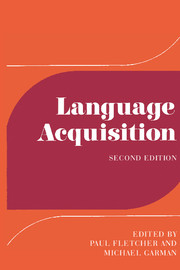Book contents
- Frontmatter
- Contents
- Contributors
- Preface
- Part I Contexts and determinants
- Part II The development of linguistic systems: phonology
- Part III The development of linguistic systems: grammar
- Part IV Later language development
- Introduction
- 21 Some fundamental aspects of language development after age 5
- 22 The development of reading: the acquisition of a cognitive skill
- 23 Language acquisition and writing
- Notes to chapters
- Bibliography and citation index
- General index
- Titles in the series
22 - The development of reading: the acquisition of a cognitive skill
Published online by Cambridge University Press: 05 June 2012
- Frontmatter
- Contents
- Contributors
- Preface
- Part I Contexts and determinants
- Part II The development of linguistic systems: phonology
- Part III The development of linguistic systems: grammar
- Part IV Later language development
- Introduction
- 21 Some fundamental aspects of language development after age 5
- 22 The development of reading: the acquisition of a cognitive skill
- 23 Language acquisition and writing
- Notes to chapters
- Bibliography and citation index
- General index
- Titles in the series
Summary
Introduction
Our treatment of the acquisition of reading follows the outline for the acquisition of any cognitive skill (Anderson 1982). Such work in its turn has developed from an older tradition of perceptual–motor skill learning whose origins go back to the early years of experimental psychology, in particular to the classic studies of the development of the skills of railroad telegraphers (Bryan and Harter 1897, 1899). In this skills literature it is useful to make a distinction between a declarative stage of acquisition ‘in which facts about the skill domain are interpreted’ and a procedural stage ‘in which the domain knowledge is directly embodied in procedures for performing the skill’ (Anderson 1982). In reading, children need to grasp what the activity of reading consists of, and on what principles the writing system that they are faced with is constructed (declarative stage); they then need to exploit this knowledge to achieve a reading performance that becomes increasingly fluent and error-free and in which many of the component skills involved become increasingly automatic (procedural stage).
The declarative stage: what do children need to know about reading?
At the declarative stage of reading development, the key insight for the child has two components: first, that speech consists of units of various sizes (phonemic features, phonemes, syllables, morphemes, words, sentences), and second, that some of these units are in reasonably close correspondence with units in the writing system the child is attempting to read.
- Type
- Chapter
- Information
- Language AcquisitionStudies in First Language Development, pp. 475 - 493Publisher: Cambridge University PressPrint publication year: 1986



